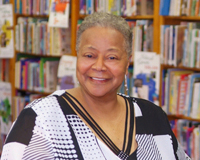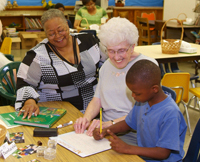
Tell us about your childhood.
I’m not a native Peorian, but I’ve lived here 60 years. I was born in Richmond, Indiana. I had a wonderful early childhood there. I was the “neighborhood princess,” being the only girl in the family with a lot of male cousins. When I was 9, my mother’s husband got a job in Macomb and moved our family there. We were only there six months when he found a better job in Peoria. I was first enrolled at Greeley School and then went on to Irving. The move to Peoria was very traumatic for me. I felt I had been snatched from my familiar surroundings and large, extended family. I understand how moves can affect children. It was a rough period for me.
Tell about your family today.
I now see myself as the matriarch of a large, close-knit family. I had seven children but only five are still living. My second child died while he was a toddler and my son Michael, died prematurely several years ago from a heart attack. My husband Howard and I have had our share of suffering, but we’ve stuck together for 52 years. We are blessed with grandchildren and great-grandchildren who are in and out of our home on a regular basis. Our five children, their families, along with my two brothers and families come together for all the holidays and family gatherings. We always have a good time and lots of food.
Who or what influenced you to become an educator?
I believe I was called by God to be in education. I always worked, but I found time to volunteer too. When my children were at Webster, I volunteered there. That’s where I met Jeanne St. Julian who was a counselor. She got me into tutoring some of her students and later suggested I get some college hours so I could be a teacher’s aide. I had only one problem: I didn’t have a high school diploma. Illinois Central College had just started an Early School Learners program where I met with Ken Williams, who was a counselor and made a plan to get my G.E.D. Winona Chestnut was also a very strong influence in moving forward with my education goals.
What were some of your challenges to overcome in earning your degrees?
Getting my high school diploma was my greatest challenge in earning my college degree. I had dropped out of eighth grade when I was pregnant with my first child. I was 13 when Darnell, my oldest son, was born. In those days it was not possible to continue school, even high school, if you were pregnant.
My mother was very determined that I work even though it was difficult with a small child and no education. She knew the value of education. She ran a day care program in Richmond, Indiana. I found out the hard way that the value of education should come first and the value of work will come later. Even though I didn’t have my high school diploma when my children were young, I was determined for them to get the education that I didn’t get for myself. That is why I was active at their schools as a volunteer, needing to make sure they were doing the “right thing.”
I’m glad I volunteered at Webster because, as I said before, it was there that I first heard God’s call for me to be the educator I thought He wanted me to be. I raised my children, worked at the unclaimed freight store and attended ICC until I had my associate’s degree. Then I enrolled at Bradley to finally obtain a bachelor’s in education. Later, as I was working at Harrison as a pre-k teacher, I heard God’s call again. That’s when I enrolled in a master’s degree program at Bradley. I was teaching and working on my master’s degree when my daughter became unable to raise her son and daughter. It would have been easy to set my education aside to take care of my grandchildren, but I didn’t. I took them in and continued on to get my graduate degree.
What other community endeavors have you been involved with?
I have been very involved with the Peoria Housing Authority for many years. Harrison housing was the residence for most of the students at Harrison School for many years. I have also been very involved with the Peoria Public Library Board, Carver Center, The Boys and Girls Club and my church. Recently I’ve been involved in a women’s prison ministry.
 How do you motivate children to learn?
How do you motivate children to learn?
I think the best way to motivate anyone to learn is to create a bond with them. Once you establish a personal relationship with a student, you can show them how passionate you are about learning. It is wonderful to share the joy of discovery with another person.
In your opinion, what are the greatest challenges for an educator in the primary grades?
The primary grades are the foundation of a person’s academic future. It is in the first years of school that the child learns how to learn. He has to attend, sit and answer questions before he can learn the basic skills. Many children are not prepared at home to manage the school environment. Teachers are now teaching many of the behavioral skills that children once learned at home. Illinois does not mandate school attendance until a child is 7 years old. Parents can allow children to be absent from school without consequences. Unfortunately for students and teachers, many parents have abdicated their responsibility. More and more responsibility and accountability is placed on teachers and administrators. The best outcomes for students occur when teachers, administrators and parents work together for education. I hear Indiana gives entrance examinations to students entering kindergarten. I think we should look into that in Illinois.
How has the teaching profession changed in the past ten years?
Teachers have to work much harder now than before. In addition to their regular duties, they often have to teach social skills that should have been learned at home or in a pre-k classroom. Discipline in many schools is a much bigger problem than it used to be and in many schools; there seems to be less parental support than in years past. Everyone seems to be very busy and less interested in becoming actively involved in their child’s school.
Tell about some of the innovative programming that has helped children at Harrison succeed.
We have been very lucky to pilot several programs that later became district-wide. The following is a list of innovative programs we have offered:
- A volunteer tutoring program comprised of community members who have, on average, each participated for at least six years and many for 12 years. Currently, there are approximately 35 regular members on our volunteer team.
- Breakthrough for Literacy was purchased with grant money secured by Harrison Staff. It is a classroom computer phonemic awareness program.
- Second Step program for improving social language skills was purchased to utilize parent volunteers to teach social skills in the classroom.
- Harrison used an ISBE Change Grant to establish HILL: Harrison Initiative for Learning and Literacy. This was a staff-created program which incorporated the five elements of reading into Harrison’s curriculum in the 1993-1994 school year and continued for 10 years.
- Light Span program was piloted for the district. This is a program to involve students and parents in playing educational video games to improve reading and math skills.
- Harrison was first in District 150 to wear uniforms.
- Fast Forward technology program has been used in attempt to use the most current technology for the remediation of reading problems.
- Free Field amplification to increase the signal-to-noise ratio was implemented in two classrooms to determine if results would warrant the purchase of the necessary equipment.
- Harrison was one of the schools chosen to pilot the district ESL program using teachers from Spain. This program was so successful that Harrison is now piloting the first bilingual program for the district. This program had brought additional staff members and students to Harrison.
You were visited by President Bush during his campaigning in 2000. What do you remember most about the experience?
President Bush’s visit to Harrison brought a lot of excitement. Days before, we were really busy with fingerprints being taken, Secret Service and many, many details to attend to. He seemed to be a very nice gentleman and brought a wonderful entourage with him. It’s just amazing how smoothly everything went.
What would you change about the school system in Peoria?
I would like to see less standardized testing done. It seems like we interrupt a lot of classroom work to test. I’m not sure that all the testing is really helping students learn more, which is the objective of the testing. Of course, there has to be some testing, and I would like to see more variety in the tests given. I am really intrigued about the kindergarten tests they give in Indiana. I would like to see more programs for the birth to age 3 group. It seems we get many pre-k students who would have benefited earlier or from more intervention. I would like to explore the idea of tying some type of parental incentives to their child’s education.
What misperceptions, if any, are there in regard to teachers in the primary school system?
The biggest misperception about primary school is that it is easy to teach. Some people even seem to think pre-k and kindergarten teachers are babysitters. This is just not true. Pre-k and kindergarten teachers should be paid the most money because it’s the most important job. As I said before, a child’s primary education is the foundation of his or her entire academic career. Children who get a poor start have a hard time getting back on track and some never do. It’s hard work to teach primary grades because you have to wear a lot of different hats—mother, clown, entertainer, disciplinarian, nurse and teacher just to name a few.
What do you consider your greatest achievement to date?
My greatest achievement is being able to work with such a great staff for the past 15 years as principal.
What would you like our readers to know that we have not asked?
I work with Youth Ministries and the Ladies Department at my church Star of Hope Full Gospel. I have a parrot and hate to fly in airplanes. TPW
